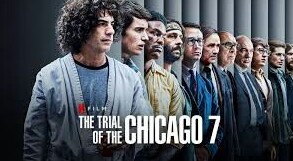That Aaron Sorkin is one of Hollywood's most relevant screenwriters is not in doubt. The muscular librettos of Charlie Wilson's War (Mike Nichols, 2007), Social Network (David Fincher, 2010) and Moneyball (Bennett Miller, 2011) gave him impetus to move forward and get behind the cameras, to experience the agility of his set-ups and the irresistible poise of his dialogue. Molly's Game (2017) was his debut feature as a director and with The Trial of the Chicago 7, he makes himself available on Netflix.
"Martin (Luther King) is dead. Malcolm (X) is dead. Medgar (Evers) is dead. Bobby (Kennedy) is dead. Jesus is dead. They tried peacefully, we're going to try something different," explains Black Panther Party founder Bobby Seale (Yahya Abdul-Mateen II) in the film about his decision to go to Chicago to protest against the war; the city is home to various groups that don't want more Vietnam and believe Humphrey will support its continuation.
Thus begins this succession of fast sequences and loaded with Sorkinian energy, which shows an occasional sequence shot, less well executed than those seen in Molly's Game, but that is invigorated in a fast and elaborate editing. The dialogues are not surprising as the New York filmmaker is accustomed to, but they do manage to convey dignity and infect with a galloping rage for the injustice these people lived through. In addition to the editing, the director relies on the dramatic weight of the real event of 1968, a tiny piece of American history that reminds us of how long this country has been forgetting respect for rights.
The defendants knew that the trial had a political dimension that prevailed over the legal one, and they wanted to take advantage of the platform that the trial gave them to expand their message; and in that decision the director errs because the film becomes a portrait without chiaroscuro, which works as a catalyst for the numerous timelines that make up the narrative and is not used by Sorkin to raise different positions on the same issue. In fact, the two-hour film is based on characters with, barely, form, and it is the robust performances of its cast that sustain its effectiveness, because this Netfix film is one of actors rather than the script. Special mention here goes to Frank Langella as the antagonist, whom he plays masterfully.
And perhaps because he should never before have played with so many protagonists in so little footage, Sorkin's portrayal of them suffers from superficiality and at times even runs the risk of caricaturing them. Moreover, the director contemplates these very different leaders only considering the shared cause of denouncing Vietnam, in the same way that the prosecution that accuses them seems to do, that is, as a single essence.
The film highlights the elements that Aaron Sorkin handles to perfection, such as humor, dizzying editing and characters who do not take themselves seriously but are brimming with strength in their convictions, while at the same time graphing the weakness of citizens in the face of the system. It is true that it is the political stances that are judged in The Trial of the Chicago 7, but the absence of conflict in the ideological entity brings the film closer to a pamphlet and abandons the development of such interesting issues as the different ways of understanding citizen sovereignty, the validation of non-violence as a form of protest or the importance of personal disagreements in decision making.
The parallelism between 1968 and 2020 is evident and that is why The Trial of the Chicago 7 does not qualify as a bad film. However, it is a self-indulgent film, aimed at comfortable viewers, while sacrificing the belligerent personality of those '68 referents in favor of a very precise and measured entertainment made for 2020 television, which makes it fall into the typical commonplaces of cinema based on true events: that rather than a portrait of that moment of yesterday, it seems to take it as an excuse to reflect the era in which the film is being made.
Translated with www.DeepL.com/Translator (free version)


So that's what the movie's about. I see it recommended on Netflix but the pictures didn't captivate for some reason. Thanks for reviewing.
You are welcome. It's an interesting film, although they seem to focus more on presenting the racial issue as we see it today than as it was in the 1960s.